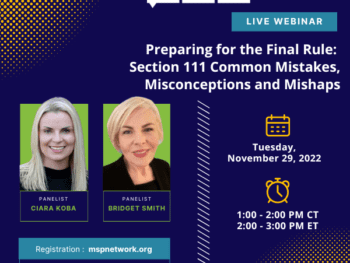Medicare Advantage Plans (MA Plans) are growing in popularity and currently cover about 30% of all Medicare beneficiaries. This is partly due to the fact MA Plans provide numerous coverage options for people with various medical needs.
The increasing use of these Plans has created confusion for claim management teams as they handle workers’ compensation cases. These are some of the more common questions they face in their daily practice.
What is a MA Plan?
In 1997, Congress expanded Medicare coverage options by creating “Medicare+Choice,” or Medicare “Part C” coverage. Under this new system, private insurance carriers were given authorization to provide Medicare Parts A and B coverage, with the ability to provide other coverage options. Medicare was again expanded in 2003 under the Medicare Part D program to provide a prescription drug benefits. In doing this, “Congress’s goal in creating the Medicare Advantage program was to harness the power of private sector competition to stimulate experimentation and innovation that would ultimately create a more efficient and less expensive Medicare system. It was the belief of Congress that the MA program would continue to grow and eventually eclipse original fee-for-service Medicare as the predominant form of enrollment under the Medicare program.” In re: Avandia, 685 F.3d 353, 362 (3rd Cir. 2012).
Click Link to Access Free PDF Download
“8 ‘Think Outside the Box’ Tactics to Settle Workers’ Comp Claims”
How Do I Determine What Interests a MA Plan Has in My Case?
When dealing with Original Medicare (Parts A and B), the conditional payment resolution process is clear and defined under statute, regulation and CMS policy. The consolidation of the COBC and the MSPRC into the Benefits Coordination & Recovery Center (BCRC) has resulted in a more efficient system. Parties have a better understanding of the process when working with the BCRC, and the SMART Act is improving the process.
Unfortunately, the BCRC does not collect claim and payment information for Medicare beneficiaries covered by a MA Plan. This is the responsibility of the private insurance plan. To make matters worse, beneficiaries have numerous options through a number of different carriers. Beneficiaries can also switch policies on a yearly basis. The end result is during the life of a workers’ compensation claim, multiple MA Plans can make payments on one claim.
Here are some tips to identifying an MA Plans’ interest:
- Use discovery tools to identify what MA Plans may have made payments related to the workers’ compensation claim. Be sure to update this information during the course of a claim.
- Communicate with opposing counsel and your attorney so they understand how MA Plans differ from Original Medicare. Creating cooperation early on can help resolve matters in a timely manner.
- When settlement is under consideration and notice is made to the BCRC to request conditional payments, also ask the claimant to confirm or deny in writing the existence of a MA Plan. If one or more is, or has been in place during the life of the claim, obtain plan name, contact and plan identification number(s).
What Rights of Recovery Do MA Plans Have?
The rights of Original Medicare are clearly defined for the most part under the Medicare Secondary Payer Act. Notwithstanding the common understanding of what rights Medicare has in workers’ compensation, questions of recovery rights are less certain when dealing with MA Plans. This has resulted in questions and uncertainty from attorneys and claims management teams handling workers’ compensation cases.
While case law around the country varies as to an MA Plan’s ability to utilize a private cause of action to recover monies paid on behalf of an injured party, it is important to follow these words of advice:
- Determine if the injured party is a beneficiary under Original Medicare, or through an MA Plan.
- When it is determined that a MA Plan exists, treat it as you would any other intervener or interested party—put them on notice of their rights.
- Understand how case law varies across the country and determine if the federal courts in your state have recognized the ability of MA Plans to recover using the private cause of action provisions under the Medicare Secondary Payer Act.
Author Michael Stack, Principal, COMPClub, Amaxx LLC. He is co-author of Your Ultimate Guide To Mastering Workers Comp Costs, and founder of COMPClub an interactive training program teaching workers’ comp cost containment best practices. Through this platform he is in the trenches on a monthly basis with risk managers, brokers, consultants, attorney’s, and adjusters teaching timeless workers’ comp cost containment strategies, as well as working with members to develop new tactics and systems to address the issues facing organizations today. This unique position allows him to continuously be at the forefront of innovation and thought leadership in workers’ compensation cost containment. Contact: mstack@reduceyourworkerscomp.com.
©2015 Amaxx LLC. All rights reserved under International Copyright Law.
Employers/Carriers/TPAs/Brokers/Vendors looking for additional information FREE resources for Workers Comp cost containment best practices are invited to access Amaxx Workers’ Comp Cost Containment Essentials training series
Do not use this information without independent verification. All state laws vary. You should consult with your insurance broker, attorney, or qualified professional.
























